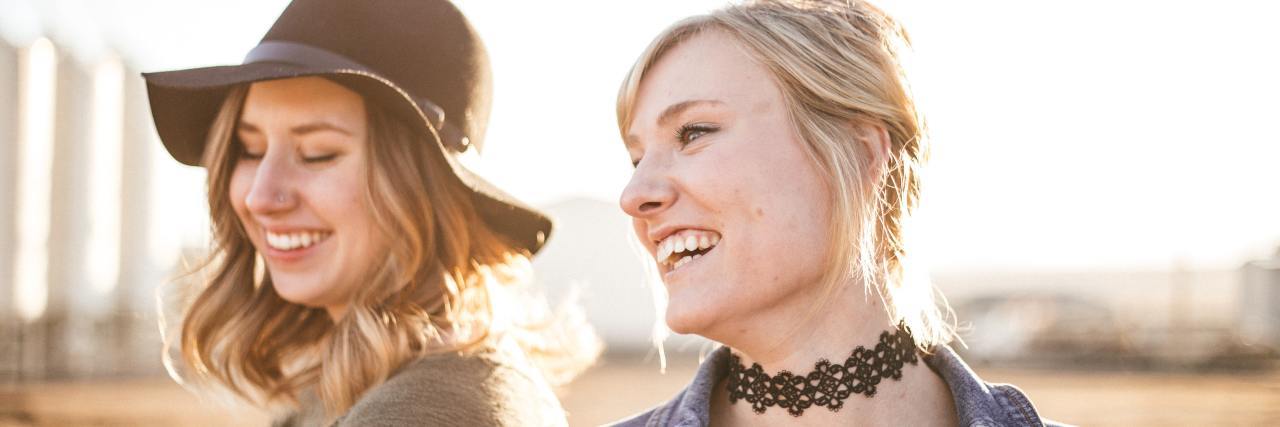When Your Best Friend Also Has a Mental Illness
Editor's Note
This story has been published with permission from the author’s best friend.
If you’re looking for creative inspiration, check out the Daily Inspirations group on The Mighty.
For years before we met, people told me I would love you. So many of our mutual friends used to tell me about how similar we were, with so many mutual interests and mutual mental health issues. And when we finally met, we connected instantly.
• What is Bipolar disorder?
I remember sitting on the bed in the spare bedroom of my apartment, window wide open, chain-smoking cigarettes and exchanging stories about the fucked up things that had happened to us, fucked up things we had done and weird shit we experienced. You intermittently popped your anxiety medication while I packed bong bowl after bong bowl of Indica strains. We had some overlapping clinical diagnoses and some similar but different ones too. I could see myself in you, like a mirror image. After 20-something years of feeling isolated and loved by my other friends but never really seen, you saw me.
We both lived with mood disorders, eating disorders, anxiety disorders. We were tattooed smokers, self-harmers, daughters of long-dead mothers. We both loved sex and the occasional drug binge. We both had wonderful, long-term, committed partners. We both longed to be well while simultaneously accepting that mental illness was a permanent part of our lives that we couldn’t help but romanticize and struggle with and commit to in our own ways.
I remember asking you what to do when you inevitably became manic. We made safety plans. I remember you asking me what to do when I inevitably self-harmed. We made crisis plans. I remember discussing how much we should discuss our weight and our eating habits. We made resource lists.
And then the time came when I looked into your eyes and it was a different you. It was this live-wire, electric version of you. You started lying to me about things like if you were using or if you were hanging out with people who you knew I knew used. And then you told me about things and acted in ways that weren’t in line with the way I knew you wanted to be, and I fought my way in to advocate for you as well as I could while trying to keep you relatively safe.
And then a time came where I was so depressed and had been texting you about it that you broke into my apartment early in the morning, nearly in tears, to find I was still alive after all.
And then there were all those times I drove you to the hospital or offered to drive you to the hospital because that was the only way you felt you could be OK.
And then there was the time where I told you about that really bizarre recurring experience I have that 99 percent of people don’t know I have that only you can even begin to understand. Because you’ve been through it too.
And then there was that time where you told me you hated me. You told me I was faking my mood disorder and that if I saw you on the street, I’d better run. But the moment I looked you in the eye, I knew it was that live-wire version of you again.
And there were times where we both told each other we couldn’t be there for each other all the time, that we needed to focus more exclusively on taking care of ourselves.
And then there was that time your partner called me to tell me I needed to come over because our worst fear had come true and I made it around the corner just in time to watch as the paramedics arrived. And I stayed back while your partner spoke to the cops. I went with your partner to the hospital where they told us they needed to take you to a bigger hospital. And then, when your stepmom called me at work the next day to tell me to come to say goodbye, I raced to the hospital from work to slip my hand in yours and sang you Bad Religion songs.
“There will be sorrow no more.”
That last thing nearly ruined our friendship. But it didn’t. It took time and space. It took me adjusting my expectations and you forgiving yourself. And I am so beyond grateful you lived. And even though we both know we will both continue to struggle from time to time, the history of our own lives and of our friendship proves that no state is permanent. It will always end. There will always be another time for us to sit on the bed, drinking tea, and smoking, and laughing way too loudly. Because we see each other. And we’re learning to navigate what it means to be a mentally ill person with a mentally ill best friend. And that’s a pretty magical kind of friendship.
Follow this journey on Nothing Exists.
Photo by Priscilla Du Preez on Unsplash

